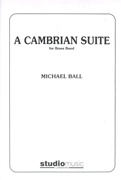Results
-
 £37.95
£37.95Between the Moon and Mexico (Brass Band - Score only) - Sparke, Philip
Between the Moon and Mexico was composed for the 1998 Finals of the National Brass Band Championships of Great Britain. The first performance took place at the Royal Albert Hall, London, on the 17th of October.The title has no hidden meaning and was chosen preciesly because it would not predetermine the style or form of the work. The composer wanted to see what sort of piece would emerge if the only influence was what had already been written. The result is a sort of musical collage in which various musical collage in which various musical elements, ranging from two or three notes to complete melodies, assume importance by virtue of their context. In a way, the piece grew out of itself.Duration: 16.30
Estimated dispatch 7-14 working days
-
 £64.95
£64.95BRASS TRIUMPHANT (Brass Band Set - Score and Parts) - Wood, Gareth
2013 National Champsionship Area Qualifying Contest - 1st Section
Estimated dispatch 7-14 working days
-
 £44.95
£44.95Bravura (A Fantasy on British Folk Songs) (Euphonium Solo with Brass Band - Score and Parts) - Graham, Peter
Bravura is a companion piece to the composer's earlier euphonium display piece Brillante, utilising the same traditional 19th century "fantasy variation" structure, familiar to generations of brass soloists. Folk songs from the four corners of Great Britain are featured; Oranges and Lemons, (England), The Blue Bells of Scotland, The Minstrel Boy (Ireland) and the famous Welsh anthem Men of Harlech.The solo is a conflation of the original version, written for the 2002 Royal Albert Hall Gala Concert, which followed the National Brass Band Championships of Great Britain. On that occasion the combined talents of virtuosi David Childs, Derick Kane, Steven Mead and David Thornton (with guests Robert and Nicholas Childs) were on display, each personalising the cadenza section towards the end. This version incorporates a published cadenza, though soloists should feel free to improvise their own material at this point.
Estimated dispatch 7-14 working days
-
 £69.95
£69.95CAMBRIAN SUITE (Brass Band - Score and Parts) - Ball, Michael
National Youth BB Contest Piece 2002
Estimated dispatch 7-14 working days
-
 £32.95
£32.95CAMBRIAN SUITE (Brass Band - Score only) - Ball, Michael
National Youth BB Contest Piece 2002
Estimated dispatch 7-14 working days
-
 £59.95
£59.95CARNIVAL (Brass Band Set - Score and Parts) - Perkin, Helen
2007 National Championships Area Qualitying Contest - 2nd Section.
Estimated dispatch 7-14 working days
-
 £35.00
£35.00Carol of the Bells (Brass Band - Score and Parts) - Littlemore, Phillip
This popular Christmas piece was composed by Mykola Leontovych around 1916. It is based on a Ukrainian folk chant known as 'Shchedryk', a New Year's carol. However, it was not until after the composer's death in 1921 that it was first introduced to Western audiences, when the Ukrainian National Choir included it on their tour of Europe and the Americas that same year. The film composer John Williams incorporated it into the score for the 1990 film Home Alone and he is credited for bringing it to a wider audience still, although it had been released on Christmas albums by a number of popular artists before that. This transcription for brass band has been adapted from the arrangement by Robert Prizeman, who created it for Libera, the world famous boys choir that he both founded and directs. Their unique, enchanting and, some say, heavenly sound delights audiences throughout the world through extensive concerts, recording and TV broadcasts. This brass band transcription introduces this skilled choral arrangement to a new genre and a whole new audience as well. Duration: 3.00
Estimated dispatch 7-14 working days
-
 £74.95
£74.95CELTIC SUITE (Brass Band - Score and Parts) - Sparke, Philip
2012 Belgian National Championships - 2nd Section. Duration 12.45 Includes: Fanfare and Dawns Werin (Folk Dance); Suo-Gan (Lullaby); Men of Harlech) Recorded on Polyphonic QPRL089D Harmony Music
Estimated dispatch 7-14 working days
-
 £37.95
£37.95CELTIC SUITE (Brass Band - Score only) - Sparke, Philip
2012 Belgian National Championships - 2nd Section. Duration 12.45 Includes: Fanfare and Dawns Werin (Folk Dance); Suo-Gan (Lullaby); Men of Harlech) Recorded on Polyphonic QPRL089D Harmony Music
Estimated dispatch 7-14 working days
-
 £37.95
£37.95CRIMOND (Brass Band) - Richards, Goff
Recorded on Polyphonic QPRL228D Master Brass (Volume Nineteen), QPRL056D National Brass Band Championships of Great Britain and Gala Concert - 1992
Estimated dispatch 7-14 working days
